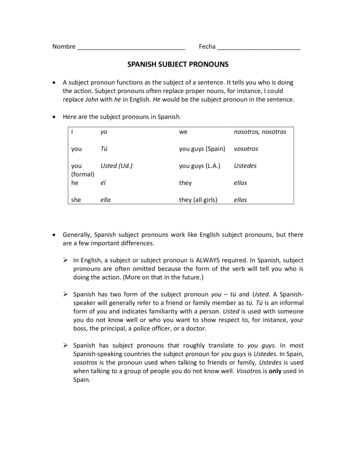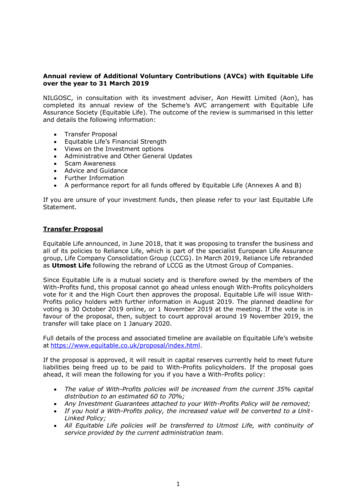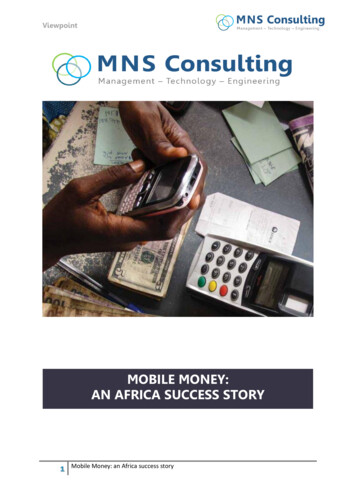
Transcription
How to talkabout money
How to talk about money1ContentsReligion, politics, sex and money are often seen as taboosubjects. But whilst we’ve become more comfortable talkingabout our beliefs and love lives, money is still often seenas a no-go subject.Not talking about money can cause problems, as every singleaspect of our lives is affected by our finances in some wayor another. If they aren’t in a good place, it might affect ourmental and physical health. If there is dishonesty, it can hurtthe trust in our close relationships with family and friends.If you need to talk to someone about money but aren’t surehow it will go, this guide will help you get started, includingtips on how to get a good outcome, share money goalsand what to do if you think the conversation may be trickyor it doesn’t go as planned.Why should we talk about money?2Why don’t we like talking about money?3Tips for how to prepare for the conversation5Tips on how to start a conversation6Tips for when you’re having the conversation7How to deal with negative reactions8How to end the conversation well9Sharing goals and attitudes to money10What is financial abuse?11
How to talk about moneyWhy should we talkabout money?There is no need to feel guilty about wantingfinancial security – it’s a basic human need.The more you open up and talk about money even the really difficult conversations - the betteryour life and the relationships will be.As well as watching someone you care aboutdeal with money issues, if you are intertwinedwith them financially at all, their problems maystart to affect your wallet – and the way youlive your life.Not communicating about money can hurt thosearound you. For example, if you and your partnerhave joint accounts or both of your names areon household bills, your money mistakes couldimpact their credit rating and their financial futureand vice-versa. It is vital to know where you standif you want to protect your finances both duringa relationship and when coming out of one.3Why don’t we like talkingabout money?Not talking about money with other familymembers can also cause issues. With olderpeople, if we haven’t talked about their financialfuture, urgent issues can easily crop up and youmay not know what their wishes are or how theywould like you to deal with the situation.Sometimes figuring things out and getting themin perspective can be much easier if you’ve gota little help, whether that’s with an expert, or thepeople closest to you.There are a million reasons why we don’tlike to talk about money. To many of us, it’sa taboo topic! It’s often seen as a rude subjectto bring up.These are some of the main reasons people givefor not talking about money. If you recogniseyourself here, maybe it’s time to take a new lookat why you feel the way you do: “I’m hopeless with money, and everyoneknows that” - Just because you’ve been oneway with money in the past, doesn’t meanthat’s how you’ll be in the future. As yougrow as a person, priorities change and thosearound you will understand that. The first stepto becoming a money pro who knows exactlywhat they’re talking about, is sorting out yourbudget. You can use our Budget plannerto help you. Find our Budget planner tool at: moneyadviceservice.org.uk/budgetplanner “Life is too short, so why deal with it? It willtake care of itself” - Yeah, life is short andenjoying it is important - including whenyou’ve retired. The truth is, it’s not going totake care of itself - it really isn’t. But puttinga bit away now doesn’t need to be painful.In fact, you don’t have to even notice it especially if your employers are puttingmoney towards it too. See our section onpensions and retirement. “I know I should talk about my finances, butI have no idea who to turn to” - It can feel likea minefield, sure. Are people out to rip youoff, or do they have ulterior motives? Knowingwhere to start can seem overwhelming. Noworries. We have you covered. Talk to us. Weare free and impartial and if you need morehelp we can pass you onto other organisationsthat you can trust.I f you’re struggling with debt you can get freeconfidential debt advice at: moneyadviceservice.org.uk/debt “I’ll look stupid” - Ok, you might. We all do attimes. If you’ve messed up though, the sooneryou deal with it the better. Feeling stupid isn’tworse than losing your home or constantlyworrying about how to put food on the table.Talk to us and get the ball rolling. If you’reworried you don’t know about a topic, useone of the hundreds of helpful guides on theMoney Advice Service website. “People will think badly of me” - Very fewof us love the idea of sharing their spendinghabits with others, and sometimes otherpeople are judgemental. But don’t let themstop you from moving forward with yourfinances. This may be a communication issuewith someone you love. “Fortunately, my partner is good with money,so I don’t have to deal with it” - We all havedifferent strengths, but being good withmoney comes with practice, so allowingsomeone else to look after everything to dowith money means that you’re not going to bein the best position if you find yourself on yourown and you do have to.
How to talk about money5Tips for how to preparefor the conversationYou might feel stressed about the idea of having adifficult conversation about money. Often, theseconversations are packed full of emotion, andyou may forget the important things you wantedto bring up. “My partner doesn’t allow me to deal withmoney” - It’s one thing to consciouslyallow someone to take care of the financesbecause you prefer it that way but if someonehas deliberately taken away your financialindependence against your wishes, you couldbe being financially abused. It’s importantto know there are things you can do to stopthis (see p11). “I don’t want to worry my family” - There arepeople you can speak to first before talkingit through with your family, who will be ableto advise you on your specific situation. Insome cases, getting your family to help canbe a really positive step because you can worktogether to solve the problem. “It always leads to an argument, so it’s bestnot to go there” - We can get really emotionalwhen we talk about money, so getting a gameplan together when you need to chat is theeasiest way to keep it factual, rather thanletting it get so emotional it turns intoan argument. This guide will help you toprepare for difficult conversations aboutmoney and show how you can make iteasier for all involved. “The situation is too bad. There is no turningthis around” - It’s not too bad. It’s notimpossible. Trust us. All the debt advisers werecommend have spoken to people who havebeen in challenging situations, and somehave felt better straight away simply throughtalking. They have then been able to get help.Talking is the first step towards changing yourfinancial circumstances. “My parents never discussed money, so whyshould I?” – Talking about money would havebeen even more of a no-go area than it istoday. In the past, there was a lot of shameabout financial difficulties and they were oftenkept hush-hush. We all pick up habits fromour parents. You may find you have followedin your parents’ footsteps by accumulatinglots of debt. Or, perhaps your partner callsyou Scrooge because you are so scared ofdebt and how it impacted your childhood.Whatever the case may be, finances need tobe talked about – regardless of whether yourparents did or didn’t. “I can’t afford professional advice“ – Thereare lots of places you can get free guidancefrom professionals. If you’re looking to getfree debt advice, check out our debt advicelocator. Want free pensions guidance? Readour guide Understanding what Pension Wiseis and how to use it.Whatever the reason you’ve been putting offtalking about money, the hardest part abouttackling a difficult conversation is often findinga way to start it. It gets easier from there.You know what, though? You don’t need to waitfor a serious situation which needs urgent actionto open up. Throughout your life you’ll have lotsof money conversations with different people –and some will be difficult. So figuring out whatyou want to say effectively now will make yourlife a lot easier.Preparing yourself with a few talking pointsmight help you. That said, this isn’t an exam atschool, so there’s no need to go overboard withpreparation – but thinking about these thingsbeforehand will help a lot: When to talk - there’s never going to be aperfect time. Bring up that you would like tochat about something later, which allows themto make space in their day. Where to talk - it’s best to find an area whereyou won’t be disturbed. It might be helpfulto stay at home where you may have usefulpaperwork, but then again, going for a walk,away from the home may be easier for others.Choose what works best for you. Who should be there - It very much dependson the situation, but everyone who has a stakein the discussion. Practise the conversation - This isn’t a theatreperformance, so you don’t need to know yourlines by heart but do think about the thingsyou want to say and have a go saying themout loud. Take it a step further and think aboutwhat the other person may say, then come upwith answers to that. Try to think of differenttypes of scenarios, not just what you wantthem to say! If you have a family member orfriend who isn’t involved, you may want to tryout a bit of role play with the conversation.One you’ve managed to get the preparation alldone and dusted, you’re in a great position towork out how to start the conversation.
How to talk about moneyTips on how to starta conversationTips for when you’re havingthe conversationSometimes it helps to start the conversationin a less direct way rather than asking themto sit down and bringing up the subject.Sometimes, knowing what your first sentenceis going to be can make you feel more confident.Potential openers could be:Here are some conversation starters: ‘I have something I’d like to talk to you aboutthat I think would help us reach our goalsmore effectively.’ If a friend of yours is experiencing somethingsimilar, maybe discuss what’s happening tothem to get the ball rolling. Maybe your situation or something similar hascome up in a programme you’re watching,book you’re reading or is in the news. Mentionhow this is similar to what you’re experiencing. Use whatever is around you to spark theconversation – bills, a new item of furnitureyou are still paying off, or something you’rewatching on TV.There are times, however, that you will needto discuss the topic more directly, especially ifit is urgent and you can’t wait for the perfectopportunity to bring up the conversation.7 ‘I’d like to talk to you about [blank], but firstI’d like to get your point of view.’ ‘I need your help with what just happened.Do you have a few minutes to talk?’ ‘I think we have different ideas about [blank],I’d like to hear your thinking on this.’Remember, a conversation is two-way, somake sure the other person is involved and notsimply a listener. Be mindful of your emotions, as well as theemotions of the person you are talking to.Getting emotional is completely valid butgetting really angry or upset might interferewith the outcome you’re seeking. Tell yourselfthat you can express these emotions atanother time, but this conversation requiresyour mind to be clear and logical. If you arefeeling particularly emotional, you mighteven want to give yourself a time and placeto directly address these emotions. That way,you can remain focused on this importantconversation, knowing that your feelings willbe addressed later. Try not to interrupt your partner. If you starttalking over each other, it might turn into anargument. You might find this difficult sinceyou probably have so much to say, but thebest way to work through this will be asa team. If you find one of you is interruptingthe other, you might want to gently raisethis as an issue and suggest some allocatedtime for both of you to speak completelyuninterrupted. Don’t blame anyone forinterrupting; simply acknowledge thisis an emotional topic and therefore itmight be a good idea to devise somerules of conversation to ensure everyonegets to speak. Being judgemental is only going to makethe other person shut down. Avoid startingsentences with accusations, such as ‘you’ andkeep it all about you, such as ‘I think’ or ‘I feel’.The faces you pull and the words you use(no insults!) also matter too. Keep to the topic at hand. Bringing up otherissues and complaints isn’t going to helpthis situation move forward. If you feel thismight be a problem, write yourself a list ofthings you can and can’t talk about during thisconversation. For example, this conversationisn’t the time to tell your partner they need tospend more time with you and less time onthe computer. This conversation is focusedon your finances. By sticking to this topicand only this topic, the conversation will beeasier for you. Try and stay about the same eye level. In otherwords, it’s best if everyone involved is seatedor standing. You don’t want one person to bephysically above or below the other. Think about who may also be able to help.Charities or organisations might come inuseful so have the numbers or websitesready to hand over.
How to talk about moneyHow to deal with negative reactionsHow to end the conversation wellNot everything is going to go to plan, so if you find you’re getting a negativereaction back, try these responses:After a difficult conversation, we generally feellike, ‘Phew! Glad that’s over. Hope I never haveto have that conversation again!’ but actually, it’sreally important to follow up after a tough chat.If Try The person doesn’t agree withthe facts you’re suggestingAsk what their reasons are and listen with an open mind. Ifyou feel they have a point, say so. If you disagree with them,suggest how you can move forward.The person blames youListen with an open mind, figure out what is making themfrustrated without getting defensive and blaming them back.Are their comments justifiable? If so, how will you addressthese comments? Are their comments simply shifting blame?If so, ask them what they feel you can BOTH do to resolve theproblems.The person is impatient or tries tochange the topicClarify the aim of the conversation and let them know whatchoices they have. Listen and note what they are saying toaddress later. Express your understanding that it is a difficultconversation, while also highlighting that it will be easier tohave it now than further down the line.The person talks a lotMake sure you leave plenty of time for the chat, yet keepthem on topic by referring to what they have said and askingrelevant questions.The person passively agrees toeverything you say or decideAllow some time to develop a relaxed atmosphere. Try hardto ask their opinion and when you get it, say it back to them.Don’t be afraid of silence and give them plenty of time tothink.Are there any other possible scenarios you think might happen?If so, write them down in the box above, along with a solution.So here are some tips on how you can do that: Acknowledge that the conversationhappened. Recognise that it was a toughconversation and highlight the positive thingsthat have come out of it. There is a hugeamount of value in appreciating that youwere able to come together, discuss a difficulttopic and even have the conversation inthe first place. Find ways to move the conversation forward.Be proactive in showing that you’ve takenthe solutions on board. Clear communicationaround next steps helps move theconversation forward.9 It can be useful to write it down. Maybe inan email or on paper that you can both referto later. It’s common for two people to takeon information in totally different ways, andthis can result in one of you thinking theoutcome was one thing, while the other thinkssomething completely different. Writing itdown can help you clarify points discussed.
How to talk about moneySharing goals and attitudes to moneyOne of the biggest reasons you and someoneelse might fall out about money, is if you are noton the same page with your goals.If one of you wants to go on a big holiday everyyear, while the other wants to save for a house —that’s going to cause issues. Maybe one of you issuper proud and is not interested in talking aboutproblems, while the other really feels the need totalk and solve the problem.Sharing your goals and values about money witheach other has been proven to improve financialsatisfaction. So, how can you understand yourgoals and attitude to money better? That’s it —talk to each other.Below are some goals and attitudes about moneywhich are worth discussing. If you know you orthe other person isn’t confident about managingtheir money, for example, it will help to zone inon how you bring up the conversation.What is your attitude to money? Do you prefer to live for today?And why is this? Are you confident managing money?And why is this? Do you think it’s important to keep trackof income and expenditure? Why/why not? Do you like to shop around to make moneygo further or do you buy on impulse? Are you open to discussions about money? Do you feel it’s important to adjustnon-essentials when life changes? Do you ask for help with your money? What are your attitudes to spending,saving and borrowing money? How was money managed by your familywhen growing up?What are your money goals? What are your long-term or short-termgoals and aspirations? What is stopping you achieving them? Are there any immediate problems you reallyshould get to grips with? Such as debts or fearof falling into debt, worries or anxieties aboutyour job or health? Even if longer-term goals seem impossibleto achieve, what are the first small steps youcould take towards achieving them? e.g. doinga budget, looking at ways to cut back or savemoney, putting a bit extra into your pension.It might be worth saving these questions foryour follow-up discussion to give you somefocus and help you move forward with yourfinancial goals. They are a great way to work outsimilarities and differences between people, andwhere those similarities and differences work orcause problems. You could even add some morequestions that are important to you.What is financial abuse?Everyone has the right to financialindependence, so if someone is controllingyour money, running up debts in your name,stopping you from being financially independentor earning your own money, it’s financial abuse.It’s more common than you think. One in fiveUK adults is a victim of financial abuse in arelationship and almost always overlaps withthese physical or emotional abuse, although itis possible to experience it on its own. If you’rein this situation, talking about money mightcause your partner or a family member to door say things that put you at risk of mentalor physical harm.It’s important to know that you don’t need tostruggle on alone. To find out more about whatcounts as financial abuse, and what you cando about it, read our guide Protecting againstfinancial abuse.11
For more help see our guides on our site:Talking to children about moneyTalking to yourself about moneyTalking to your partner about moneyTalking to friends about moneyTalking with older people about moneyMoney Advice Line 0800 138 7777*Typetalk 1800 1 0800 915 4622Money Advice ServiceHolborn Centre120 HolbornLondon EC1N 2TD Money Advice Service* Calls are free. To help us maintain and improve ourservice, we may record or monitor calls.
Why should we talk about money? Why don't we like talking about money? There is no need to feel guilty about wanting financial security - it's a basic human need. The more you open up and talk about money - even the really difficult conversations - the better your life and the relationships will be. As well as watching someone you care about










